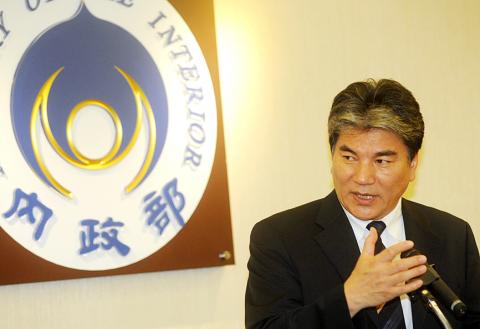Following a series of controversial decisions concerning urban renewal projects, the Ministry of the Interior (MOI) has drafted amendments to the Urban Renewal Act (都市更新條例) — as the minister promised in March — aimed at better protecting the rights of property owners.
“To eliminate controversies surrounding urban renewal, after three conferences, five law-revision panel meetings and nine Cabinet meetings we have come up with a series of amendments to the Urban Renewal Act that we hope will go some way toward protecting the rights of all stakeholders,” Minister of the Interior Lee Hong-yuan (李鴻源) told a press conference at the ministry yesterday.
“Forty-eight out of 67 articles in the current law will be revised, 17 new clauses are to be added, while one article is to be removed,” he added.

Photo: Wang Yi-sung, Taipei Times
At present, the law only offers minimal protection to property owners, especially those who are the subject of an urban renewal project.
For instance, the value of property is currently estimated by real estate appraisers hired by the construction firm that initiates the renewal project; a property owner opposed to an urban renewal -project is given just one opportunity to object; and as long as two thirds of land or property owners in a certain area agree to the project, the properties of those who are opposed to it can be seized by force, regardless of their owners’ wishes.
“In the draft amendments, the value of property has to be determined by appraisers hired by both the construction firm, or whoever initiates the project, and property owners, based on the estimated increased property value after the renewal,” he said. “The threshold for approval has also increased — four-fifths of the land or property owners involved must express consent before a project can now be approved.”
In addition, land or property owners will be given more opportunities to express their opposition to a project and when there is dispute, the courts will have the final say, Lee said.
Construction and Planning Agency Director-General Yeh Shih-wen (葉世文) said that while the current law leaves it to the initiator of a urban renewal project — usually a construction firm — and property owners to resolve their disputes, the proposed amendments would include government and court intervention if the two sides fail to come to a mutually acceptable solution.
Urban renewal issues attracted considerable public attention in March when the homes of the Wang (王) family in Taipei’s Shilin District (士林) were demolished to make way for a construction firm-initiated urban renewal project, despite the strenuous objections of the family.
The Taipei City Government said the Wangs did not express their opposition soon enough and were thus considered to have legally consented to the project. Also, because three-fourths of the -residents in the area agreed to it, the opposition of the Wangs was legally invalid.
The forced demolition of their properties, which came after physical clashes between more than 1,000 police officers and as many as 400 supporters of the Wang family, triggered a public outrage.
The city government later admitted there were “deficiencies” with the urban renewal law and the minister promised to come up with amendments to be presented to the legislature.

The manufacture of the remaining 28 M1A2T Abrams tanks Taiwan purchased from the US has recently been completed, and they are expected to be delivered within the next one to two months, a source said yesterday. The Ministry of National Defense is arranging cargo ships to transport the tanks to Taiwan as soon as possible, said the source, who is familiar with the matter. The estimated arrival time ranges from late this month to early next month, the source said. The 28 Abrams tanks make up the third and final batch of a total of 108 tanks, valued at about NT$40.5 billion

Travel agencies in Taiwan are working to secure alternative flights for travelers bound for New Zealand for the Lunar New Year holiday, as Air New Zealand workers are set to strike next week. The airline said that it has confirmed that the planned industrial action by its international wide-body cabin crew would go ahead on Thursday and Friday next week. While the Auckland-based carrier pledged to take reasonable measures to mitigate the impact of the workers’ strike, an Air New Zealand flight arriving at Taipei from Auckland on Thursday and another flight departing from Taipei for Auckland on Saturday would have to

A group from the Taiwanese Designers in Australia association yesterday represented Taiwan at the Midsumma Pride March in Melbourne. The march, held in the St. Kilda suburb, is the city’s largest LGBTQIA+ parade and the flagship event of the annual Midsumma Festival. It attracted more than 45,000 spectators who supported the 400 groups and 10,000 marchers that participated this year, the association said. Taiwanese Designers said they organized a team to march for Taiwan this year, joining politicians, government agencies, professionals and community organizations in showing support for LGBTQIA+ people and diverse communities. As the first country in Asia to legalize same-sex

MOTIVES QUESTIONED The PLA considers Xi’s policies toward Taiwan to be driven by personal considerations rather than military assessment, the Epoch Times reports Chinese President Xi Jinping’s (習近平) latest purge of the Chinese People’s Liberation Army (PLA) leadership might have been prompted by the military’s opposition to plans of invading Taiwan, the Epoch Times said. The Chinese military opposes waging war against Taiwan by a large consensus, putting it at odds with Xi’s vision, the Falun Gong-affiliated daily said in a report on Thursday, citing anonymous sources with insight into the PLA’s inner workings. The opposition is not the opinion of a few generals, but a widely shared view among the PLA cadre, the Epoch Times cited them as saying. “Chinese forces know full well that